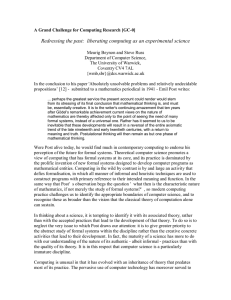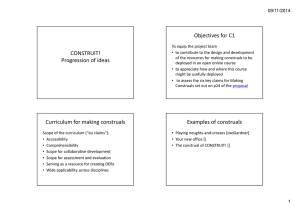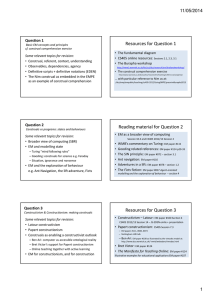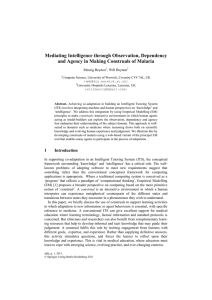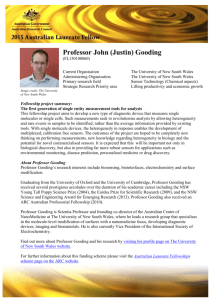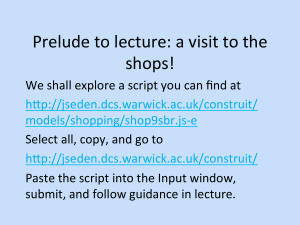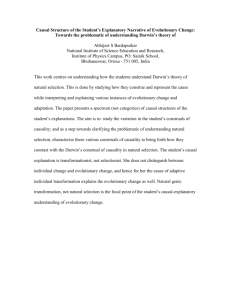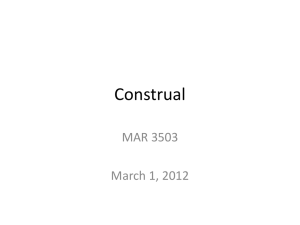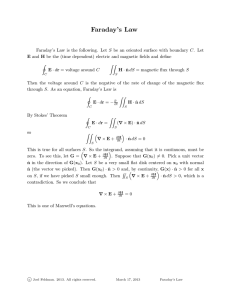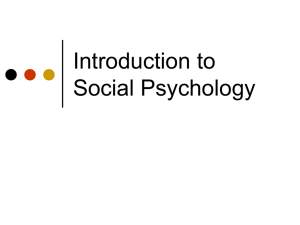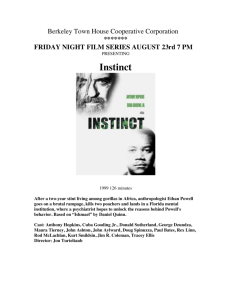Redressing the past: liberating computing as an experimental science
advertisement
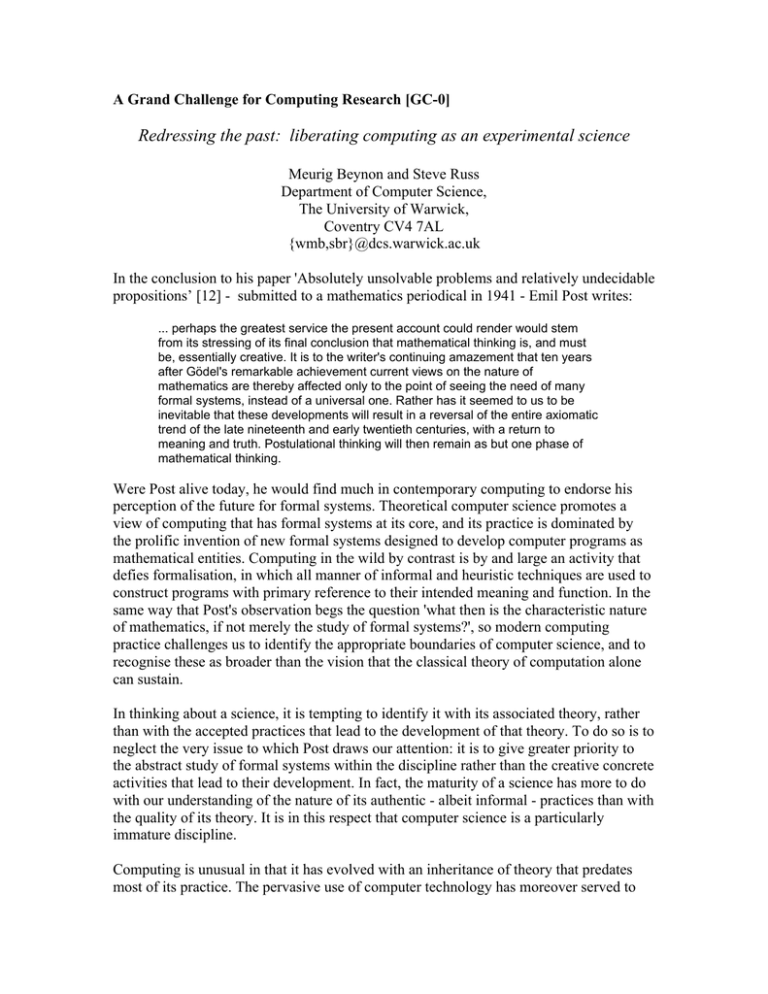
A Grand Challenge for Computing Research [GC-0]
Redressing the past: liberating computing as an experimental science
Meurig Beynon and Steve Russ
Department of Computer Science,
The University of Warwick,
Coventry CV4 7AL
{wmb,sbr}@dcs.warwick.ac.uk
In the conclusion to his paper 'Absolutely unsolvable problems and relatively undecidable
propositions’ [12] - submitted to a mathematics periodical in 1941 - Emil Post writes:
... perhaps the greatest service the present account could render would stem
from its stressing of its final conclusion that mathematical thinking is, and must
be, essentially creative. It is to the writer's continuing amazement that ten years
after Gödel's remarkable achievement current views on the nature of
mathematics are thereby affected only to the point of seeing the need of many
formal systems, instead of a universal one. Rather has it seemed to us to be
inevitable that these developments will result in a reversal of the entire axiomatic
trend of the late nineteenth and early twentieth centuries, with a return to
meaning and truth. Postulational thinking will then remain as but one phase of
mathematical thinking.
Were Post alive today, he would find much in contemporary computing to endorse his
perception of the future for formal systems. Theoretical computer science promotes a
view of computing that has formal systems at its core, and its practice is dominated by
the prolific invention of new formal systems designed to develop computer programs as
mathematical entities. Computing in the wild by contrast is by and large an activity that
defies formalisation, in which all manner of informal and heuristic techniques are used to
construct programs with primary reference to their intended meaning and function. In the
same way that Post's observation begs the question 'what then is the characteristic nature
of mathematics, if not merely the study of formal systems?', so modern computing
practice challenges us to identify the appropriate boundaries of computer science, and to
recognise these as broader than the vision that the classical theory of computation alone
can sustain.
In thinking about a science, it is tempting to identify it with its associated theory, rather
than with the accepted practices that lead to the development of that theory. To do so is to
neglect the very issue to which Post draws our attention: it is to give greater priority to
the abstract study of formal systems within the discipline rather than the creative concrete
activities that lead to their development. In fact, the maturity of a science has more to do
with our understanding of the nature of its authentic - albeit informal - practices than with
the quality of its theory. It is in this respect that computer science is a particularly
immature discipline.
Computing is unusual in that it has evolved with an inheritance of theory that predates
most of its practice. The pervasive use of computer technology has moreover served to
reinforce established attitudes that privilege theory over practice. If we presume that all
our experience is mediated by symbols and logic, can be cast in digital form, or
accounted for by a suitably grand Theory of Everything, we cannot appreciate the full
import of Post's conclusion: "... that mathematical thinking is, and must be, essentially
creative". The inadequacy of a 'literary' view of science, that gives a more exalted status
to the study of abstract symbolic representations than to interaction in the laboratory, is
exposed by the philosopher of science David Gooding in his study of Faraday's
researches in electromagnetism [6]. Gooding’s analysis is helpful in identifying a
perspective on computing that can embrace both its formal and informal aspects, and help
in understanding its potential as an experimental science.
In broad terms, Gooding's concern is to show that Faraday's knowledge of
electromagnetic phenomena, as it evolved through practical experiment and
communication with other experimental scientists, was embodied in the physical artefacts
and procedures for interaction, observation and interpretation that he developed, and that
‘construals’ [6] of this nature have an indispensable role in our appreciation of the
science of electromagnetism. In this context, experiment has a significance far beyond
that in our popular understanding of the scientific method (as expressed for instance in
[15]: "One develops a theory that explains some aspect of reality, and then conducts
experiments in order to provide evidence that the theory is right or demonstrate that it is
wrong."). Though Faraday's experiments did eventually underpin Maxwell's
mathematical theory, they initially had a far more primitive role. For instance, they
served to distinguish transient effects from significant observables, and to relate
Faraday's personal construals of a phenomenon to those of others who had typically
employed different modes of observation and identified different concepts and
terminology. Such experiments were not conducted post-theory to ‘explain some aspect
of reality’, but rather to establish pre-theory what should be deemed to be an aspect of
reality.
The question ‘Is computing an experimental science?’ has been topical in theoretical
computer science circles ever since it was first posed by Milner in the inaugural lecture of
the Laboratory for Foundations of Computer Science in 1986 [9]. Milner introduces his
paper with reference to “a double thesis: that the design of computing systems can only
properly succeed if it is well grounded in theory, and that the important concepts in a
theory can only emerge through protracted exposure to application”. Whilst Milner’s
thesis explicitly acknowledges the benefit that experimental practice can bring to preexisting theory, it is not concerned with the role in computing – if any – for pre-theory
experiment such as Faraday practised in physics. To address Post’s agenda fully, it is
necessary to identify computing as an experimental science in this more primitive sense.
Traditional sciences developed their roots in practice rather than in theory. Three features
that are not fully represented in ‘experiments to test theory’ are characteristic of pretheory experimentation in these fields. Each is concerned with a different aspect of
gaining access to stable experience that can be coherently interpreted. Experience that is
suitable for the articulation of a theory has to be:
- interpreted with respect to a preconceived context;
- circumscribed in respect of relevance;
- amenable to consistent interpretation.
In contrast, the construals with which an experimenter records and refines her current
understanding through interaction pre-theory are:
- influenced by factors in the situation that are as yet unidentified;
- subject to interpretation and interaction in ways that are as yet unknown;
- capable of exposing inconsistencies and ambiguities that are as yet unresolved.
In the pre-theory context, these characteristics are qualities of construals as
representational devices, relating to situation, ignorance and nonsense respectively, that
are beyond the expressive scope of a formal system.
The above discussion helps to identify the following characteristics to be expected of
computing as an experimental science:
•
The philosophical orientation of such a science must admit semantic frameworks
other than those based upon formal symbolic interpretation. It is evident that the way
in which Faraday’s construals ‘represent’ phenomena is quite different in character
from that in which the symbols of a formal theory are given meaning. As Gooding
emphasises, though a construal may make use of symbols whose meaning is encoded,
it fulfils its representative function primarily because of the correspondence between
the experimenter’s manipulations of the construal and specific interactions with
physical apparatus. The meaning of the construal cannot be appreciated in isolation
from these interactions, which in many cases require the most skilful application of
experimental techniques and may serve no more than a private and ephemeral role in
helping to record and advance understanding. The somewhat polemical writings of
the computer scientist Peter Naur are particularly relevant in this connection [10, 11],
as they highlight the need to study interpretation and meaning with reference to what
William James characterises as ‘the personal stream of thought’[8].
•
The science of computing must be founded upon principles that guide and
characterise its practice. It may be appropriate to identify these principles with a
‘scientific method’, provided that its scope is broad enough to take account of
situation, ignorance and nonsense. Brian Cantwell Smith, whose profound analysis of
computing has spanned over twenty five years, concludes in [13] that ‘computing is
not an autonomous subject matter’ – rather that ‘the considerable and impressive
body of practice associated with them amounts to … neither more nor less than the
full-fledged social construction and development of intentional artefacts’. This
conception is well-matched to Gooding’s notions on the development of construals in
physical science, but also accommodates the generalisation that is appropriate to
computing, in which model-building is routinely concerned with representing
phenomena that – unlike those in the natural world – are potentially artificial,
imaginary and subjective in character.
•
Whatever the science of computing is, it is most unlikely to be as yet unrepresented in
practice. And - extrapolating from Post’s observations about mathematics - it will be
more closely associated with activities (such as validation) that are directly concerned
with meaning and truth than with activities (such as verification) that primarily relate
to formal systems. Candidate activities include the requirements modelling that
precede formal specification, the development and use of spreadsheets in software
development, and empirical processes such as user-interface design that involve
experimentation and evaluation. The challenge to be faced is in relating informal
practices to principles in a coherent fashion so as to enfranchise approaches to
building computer programs without focusing upon their formal semantics.
Naturally enough, we are proposing the above conceptual framework for computing as an
experimental science, and identifying its elaboration as a grand challenge, because we
ourselves have already devoted much research to its realisation [1,2,3,4,5,16, 17]. The
key idea in our research has been that of building computer-based construals to embody
the patterns of agency and dependency amongst observables that we project on to the
situations to which they refer. The correspondence between a situation and its construal is
established and elaborated through interaction with the situation and with the construal,
so that the interpretation of the construal is ‘given in experience’ rather than governed by
a formal semantics. The principles by which such a construal is built to represent a
situation are similar to - though more general than - those by which a spreadsheet is
constructed and interpreted.
The three characteristics of computing as an experimental science identified above are all
represented in our research. The principles, notations and tools that have been developed
over the last twenty years provide the core of a final year undergraduate module and are
illustrated by a web archive containing about 120 models [17]. Our research originated in
practical model-building, and its philosophy, principles and tools continue to develop in
response to innovative project work at undergraduate and postgraduate level. The primary
emphasis has been on proof-of-concept and on making connections with other
approaches to software development, especially those that exploit dependency
maintenance. The most significant application of our approach to date has been that
pioneered by Richard Cartwright at the BBC in connection with digital TV broadcasting.
There are patent connections with the work of Gooding, and clear evidence of the
generality that Cantwell Smith anticipates of ‘intentional science’. In the spirit of Post’s
‘return to meaning and truth’, our treatment of observables in model-building is
reminiscent of mathematics prior to its formalisation in the 19th century [1, 14]. Like
spreadsheets, our models can be viewed as capturing states as we experience them ‘in the
stream of thought’, and their semantics is rooted in a fundamental tenet of James’s radical
empiricism – that primitive knowledge rests on the way in which ‘one experience knows
another’ [5, 7].
More than sixty years after Post was writing, formal systems still exercise a major
influence over academic views of computing. This prompts some to attach too much
importance to the role of formal semantics, and others to associate principled approaches
exclusively with inappropriate aspirations towards formalisation. It may well be that the
culture of computing has played its part in promoting the modern infrastructure for
managing university research, in which it is assumed that the quality of contributions to a
subject can be assessed by quantitative metrics. This kind of development in respect of
formal evaluation makes research of the kind proposed here vulnerable. Would Post have
been amazed at this? Perhaps not. His paper – which included an extraordinary appendix
in which he set out his own embryonic ideas about mathematics beyond formalisation –
was rejected. One of the most important grand challenges for today’s computing research
community is surely to take note of Post’s insight, and open its mind to the emergence of
computing as an authentic experimental science.
References
1. W M Beynon and S B Russ, The Development and Use of Variables in Mathematics & Computer
Science, in The Mathematical Revolution Inspired by Computing, IMA Conf Series 30, 285-95, 1991.
2. W M Beynon, J Rungrattanaubol, J Sinclair, Formal Specification from an Observation-Oriented
Perspective, in J.UCS 6(4), 2000, http://www.jucs.org/jucs_6_4/formal_specification_from_an
3. W M Beynon, Liberating the Computer Arts, Proc DALI'2001, 1st Int. Conference of Digital and
Academic Liberty of Information, University of Aizu, Japan, March 2001
4. W M Beynon, Empirical Modelling and the Foundations of Artificial Intelligence, Computation for
Metaphors, Analogy and Agents, LNAI 1562, Springer, 322-364, 1999.
5. W M Beynon, Radical Empiricism, Empirical Modelling and the nature of knowing, in Proc WM2003
Workshop on Knowledge Management on Philosophy, Luzern, April 2003, http://sunsite.informatik.rwthaachen.de/Publications/CEUR-WS/Vol-85, ISSN 1613-0073
6. David Gooding, Experiment and the Making of Meaning, Kluwer Academic, 1990
7. William James, Essays in Radical Empiricism, Bison Books, 1996
8. William James, Principles of Psychology, Henry Holt USA, 1890, reprinted Dover, 1950
9. Robin Milner, Is computing an experimental science? Journal of Information Technology 2:58-66, 1987
10. Peter Naur, Knowing and the Mystique of Logic and Rules, Kluwer Academic, 1995
11. Peter Naur, The Anti-Philosophical Dictionary, naur.com, 2001
12. Emil Post, Absolutely unsolvable problems and relatively undecidable propositions, in M Davis, The
Undecidable, Raven Press Books, 1965
13. Brian Cantwell Smith, The Foundations of Computing,
http://www.ageofsig.org/people/bcsmith/print/smith-foundtns.pdf (13/7/02)
14. Steve Russ, The Mathematical Works of Bernard Bolzano, OUP 2004 (to appear)
15. Donald Sannella, What does the future hold for theoretical computer science? Proc. TAPSOFT97, Lille,
France 1997
16. http://www.dcs.warwick.ac.uk/modelling
17. http://empublic.dcs.warwick.ac.uk/projects
